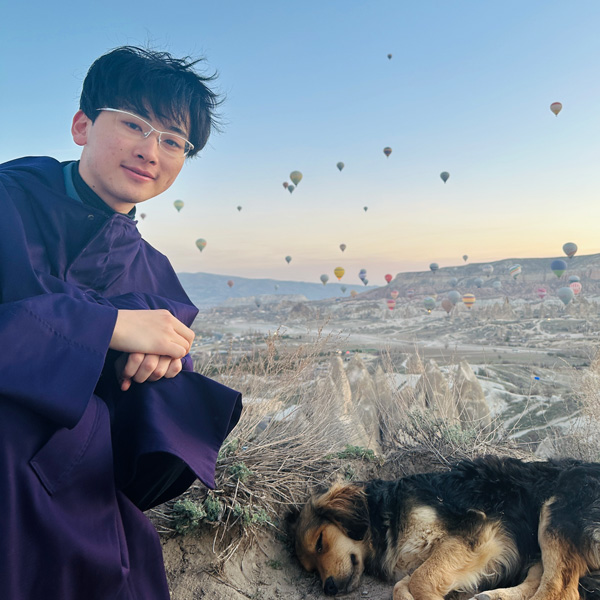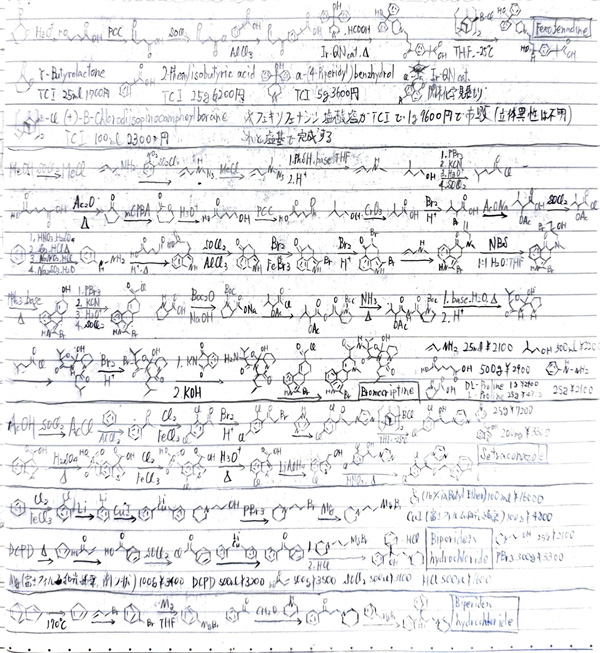Disclaimer: machine translated by DeepL which may contain errors.
 Eggs of Science
Eggs of Science 
Chemistry in Harmony: A Researcher Bridging Piano and Electrons

Yuma Yoshida (Department of Chemistry, 4th year)
Birthplace: Yamatotakada City, Nara Prefecture
Alma Mater: Nada Senior High School
Q. What were you interested in when you were in junior high school ?
A. Chemistry experiments in Faculty activities
I joined the Chemistry Club and fell in love with experiments. I had made up my mind that I would not do research until I was a university student, so I immersed myself in experiments that I just found interesting, such as making azulene, a blue hydrocarbon, and Lonsdaleite, an allotrope of carbon.
Q. What book or textbook would you recommend to high school students?
A. "Frontier Orbital Theory in Organic Chemistry" (by Miyoshi Inagaki et al.)
This book builds organic chemistry from scratch based on a theory called frontier orbital theory. This is a good book for high school students who are just beginning to learn organic chemistry, as it enables them to master the difficult concept of "orbitals" and how to handle them without complicated calculations.
Q. What made you decide to enter the Faculty of Science?
A. I was attracted to the study of "chemistry" itself.
I was admitted through a school-recommended selection process, so I chose my Faculty when I applied. At the time, I hardly understood the differences between faculties, and I was torn between the Faculty of Engineering and the Faculty of Pharmaceutical Sciences, but I decided to go to the Faculty of Science because I was attracted to the theory of chemistry itself.
Q. What made you most happy in your research?
A. The moment when I was able to synthesize the target compound.
Before I can remember, I was exposed to Dragon Quest VIII, an RPG, and was fascinated by the attempt to create something new by mixing materials. Therefore, the moment I mix reagents to create the substance I envisioned and obtain it as a crystal, I feel happiness.
Q. What do you enjoy about research and learning?
A. The ability to understand phenomena around us.
For example, "Why can you erase letters with an eraser?" "Why do painkillers relieve pain?" Why does exercise make you sleepy and caffeine makes you awake? I enjoy the moment when I can solve something that is happening in our daily lives.
Q. What are your hobbies?
A. Playing the piano.
I have been learning the piano since I was a child and continue to study it. Performing classical music in concerts, improvising and transposing pop music, and playing in an ensemble with others are my daily relaxation.
Q. Where does your inspiration come from ?
A. Always having chemistry in the back of my mind.
Somewhere along the line, I started having some kind of compound in my head no matter what I was doing. For example, when I was in high school, I always had a nitrogen six-membered ring (hexazine) in my head. The state of being in a constant state of thinking about chemistry gives me ideas.
Q. What is your weakness?
A. Directionlessness.
When I drive, I cannot reach my home without using a map, even if it is within 3 minutes of my parents' house. I have learned that people are apparently not suited for this.
Q. What do you do on your days off?
A. Play with friends.
I try to be involved in a number of communities, including several clubs, a group of mathematical enthusiasts, and friends from elementary school. The next weekend, I am planning to take a bullet trip with a group of chemistry buffs I met in high school, playing random dice with all the cities, towns, and villages.
Q. What do you do for relaxation in your daily research and study?
A. Cooking for quality
In Tokyo, where prices are high, cooking for oneself is a necessity when one leaves one's parents, but since one cannot afford to cook every meal, one must make full use of leftovers. It is difficult to keep eating the same food for every meal without getting tired of it, unless you make the food as delicious as possible.

Notes from my junior high school days
Message


